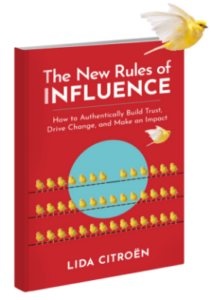When I speak on reputation management and personal branding, I enjoy telling audiences that as much as I wish the topic were highly sophisticated and complex, personal branding is relatively simple. There are no tricky  formulas or graphs. In fact, I share one graphic (the formula to building credibility) and very few statistics.
formulas or graphs. In fact, I share one graphic (the formula to building credibility) and very few statistics.
While personal branding might be simple, it is not easy. The journey to uncover your values, create a strategy for positioning yourself, and sticking to those values at all costs is sometimes challenging.
Here are my simple ABCs for building a meaningful and impactful personal brand:
As
The foundation of personal branding rests on authenticity: The ability to tap into your genuine, humble, and individual human qualities from which your identity, personality, and character stem. Most of us walk around without much thought to being “authentic.” We expect that others will take us as they see us. Some of us even boast, “What you see is what you get!”
But is it? Are you living authentically — using your values, beliefs, and dreams guide you? Are you letting others know you — truly know you — or are you hiding behind a shield of appropriateness and conformity?
By understanding and exploring your passions, interests, motivators, and challenges, you can better articulate your value to the audiences who need to see you as relevant. The goal is to have control over the brand you live, how it’s expressed, and how others assign you value and relevance. Authenticity is the critical component to developing successful personal and business brands that have longevity.
Personal branding is the process of articulating your value proposition to a target audience and building a compelling reputation. In order to effectively develop and communicate a solid personal brand, we need to know who we are, how we want to be perceived, who we need to focus our efforts towards, and what results we expect to receive. These are all important ingredients in this personal branding formula. Leave one out and it just doesn’t work the same way. Holding yourself accountable can be a very daunting task! Living up to someone else’s expectations is often easier – there are consequences to not following through. But we can easily let ourselves off the hook when it’s convenient to do so. Put reward/consequence systems in place to keep yourself accountable and stay on track.
In personal branding we strive to make ourselves relevant and compelling to a specific target audience — and that’s not everyone! Not everyone you work with or network with will get your jokes, find you compelling, or feel good about you. Targeting those clients, customers, and stakeholders who will find you relevant is critical and cuts down on your marketing efforts!
If your goal is to win over a colleague who insists on holding on to their first impression of you, when you were naive and unaware of your personal brand goals (and maybe you made some mistakes in how you treated others), realize that some people will never come around. Instead, focus on building brand relevance with audiences who hold opportunities for you (i.e. your supervisor, clients, vendors, key staff) and not on people who are harder to win over and have little influence on your future.
Bs
Bold:
While authenticity is at the heart of personal branding, in order to develop your own unique identity, you first must identify the genuine traits, skills, and values that make you compelling. It starts with understanding your values: What bold promises will you uphold? What do you stand for? What is so core to your moral and ethical fiber that if it were removed you would not be you? How do your values set the expectation others can have for you? Only after you understand your bold values can you begin to market yourself effectively to the audience who most needs you.
Focusing on what genuinely makes you unique allows you to grow your brand from a place of strength, while understanding and managing weaknesses. At the heart of effective brand development is clarity on your beliefs – practicing what you preach; being totally clear about who you are, what you stand for, and what you do best. Not everyone wants to be a leader, a resource for others, or a team player. That’s okay!
Only after a critical and honest assessment of your foundational beliefs can you begin to map the distance between how you want to be known (desired reputation) and how you are known today (current reputation). Only with this understanding can you begin building the legacy you desire. The discovery process is very internal and introspective, but when you start from the core, you develop a brand that sticks – because it’s genuine and compelling.
People form opinions about us based on many things – their own biases and prejudices, as well as our behavior. How we act influences how others see us. And how others see us affects the opportunities we get assigned. In personal branding, we take control of our reputation (perception) in order to craft and manage our legacy. How do you want to be seen by others who matter (your audience)? What will it take to make that perception reality? How are you behaving in person and online.
The person who seeks to be known as approachable needs to be approachable — they leave their office door open, have good eye contact, and include others in the conversation. Similarly, the person who seeks to be known as credible backs up their bold value statements with action. Behavior is where we put action to our beliefs. Or not…
Cs
I mentioned the one formula in my program: The formula for credibility. It is really quite simple: Credibility = Values + Action. You need to make it very clear to your target audience what it is that makes you special; what it is that you value and believe in that are truly assets to your personal brand.
Then you need to walk the talk. You need to live those values in everything that you do in order to earn credibility. If you want to be known as honest and that’s something that you really value, then you’re going to demonstrate honesty. You’re going to be honest. You’re going to attract honesty and transparency. After doing this, you will earn credibility and a reputation for someone who is honest.
Your personal narrative is the way you communicate, internally and externally about your value. If you’re filled with fear and self-doubt, that undoubtedly is reflected in how you come across to others. Becoming aware of how you promote and communicate your passions and values directly impacts how others will appreciate you.
Do you use the wrong narrative when talking to others (or yourself) about your plans and your vision? Maybe the reason people see you as difficult to get along with is because you complain about your work day, instead of celebrating the fact that you have a job and are contributing to the organization? We can easily look outward to find reasons and excuses for missed opportunities and to explain our shortcomings, but it could also be we’re telling the wrong message in the first place.
In branding, we drive towards legacy – the reputation we create for ourselves today and the way we will be remembered by clients, patients, colleagues, and our community a long time from now. We pay attention to how our actions, marketing, relationships, and products reflect our values and our vision.
Building trust is how we build integrity and credibility. By stating our values and acting consistent with what we believe, our target audiences can learn to trust us. Trust affects how our audiences will feel about us. If we want our audience to feel safe, valued, loved, validated, and respected, we must build trust.
Across all mediums — from in-person networking to social media, from body language to image to your messaging and elevator pitch — are you consistently articulating your value and demonstrating action towards that value. That is how you build consistency for your personal brand.
While I sometimes wish my topic was more complicated and included complex diagrams, I am happy that it truly comes down to one basic thing: You have the ability to get control over how you are perceived in the world, and that is a very empowering place to work from.



Love it Lida. Such a perfect list of ABCs!!!
Love it Lida. Such a perfect list of ABCs!!!